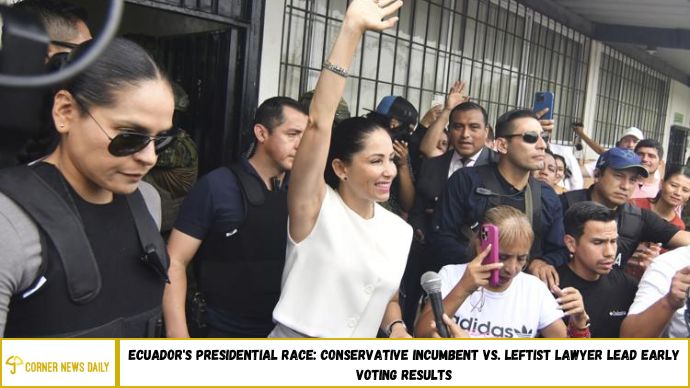GUAYAQUIL, Ecuador — Ecuador is expected to hold a runoff election later this year to determine its next president, as early results from Sunday’s first-round voting revealed a narrow race between conservative President Daniel Noboa and leftist lawyer Luisa González.
With 66% of the ballots counted, figures from Ecuador’s National Electoral Council showed Noboa securing over 3.09 million votes (44.7%), while González received more than 3.02 million votes (43.8%). The remaining 14 candidates trailed significantly behind.
This election is shaping up to echo the 2023 race, where voters ultimately elected the young, wealthy Noboa over González, a prominent figure backed by the country’s most influential president in recent history.
All candidates in Sunday’s race promised to tackle the escalating crime rates that have altered the everyday lives of Ecuadorians over the past four years. The surge in violence is largely attributed to the rise in cocaine trafficking from neighboring Colombia and Peru. With many voters having directly experienced crime, the election has become a referendum on whether Ecuador needs a new direction with a third president in four years, or if Noboa deserves another term.
Ecuador’s National Electoral Council also reported a high turnout, with over 83% of the nation’s 13.7 million eligible voters participating in the election. Voting is mandatory in Ecuador.
In Guayaquil, Ecuador’s largest port city, long lines formed outside a public university where tens of thousands were expected to cast their ballots, first in light rain and later in scorching sun.
Early Voting Results: Conservative vs. Leftist Lawyer
Ecuador’s presidential race has ignited widespread interest both domestically and internationally, as early results show a neck-and-neck competition between two prominent figures: Daniel Noboa, the conservative incumbent, and Luisa González, the leftist lawyer.
- Daniel Noboa: As the current president, Noboa’s conservative stance has focused on economic growth, security, and maintaining Ecuador’s international relationships. He has positioned himself as a defender of free-market policies and seeks to curb corruption, emphasizing Ecuador’s role in global trade.
- Luisa González: On the other hand, González, representing the left, has drawn support from working-class communities with promises of increased social programs, a stronger welfare state, and aggressive reforms to tackle income inequality. Her platform resonates with voters who feel left behind by economic policies favoring the wealthy.
Key Issues in the Election
As these two candidates take the lead in early voting, the election has come down to a few key issues that have dominated public discourse:
- Economic Inequality: While Noboa focuses on promoting business and trade, González advocates for policies that redistribute wealth and provide greater access to healthcare, education, and social services.
- Security: With crime and drug-related violence on the rise in Ecuador, both candidates are putting forward their strategies for improving safety, but they differ sharply on how to address the root causes of these problems.
- International Relations: Ecuador’s role in global affairs, particularly with regional neighbors and major powers, is another central issue. Noboa supports a more outward-looking, pro-business approach, while González emphasizes a fairer and more regionally focused foreign policy.
Early Voting Trends and Implications
As of the latest reports, Daniel Noboa is leading in early voting, but Luisa González is not far behind, gaining significant support in Ecuador’s rural areas and among young voters. The final outcome of this election could shift Ecuador’s political and economic direction:
- If Noboa wins, expect continued economic liberalization and a firm stance on security and law enforcement.
- If González secures the presidency, Ecuador may see major reforms, especially in terms of social justice, wealth redistribution, and increased government intervention in the economy.
What’s at Stake for Ecuador?
The results of this presidential election are vital not only for Ecuador’s domestic future but also for its position in the global political and economic sphere. The choice between these two candidates reflects broader global trends: the tension between free-market conservatism and left-wing populism.
- Economic Growth vs. Social Welfare: Voters must decide if they want policies that prioritize economic growth and global trade (Noboa) or social welfare and equity (González).
- Security and Law Enforcement: How the next leader plans to tackle crime will significantly impact national safety and international perceptions of Ecuador.
- Regional Leadership: With shifts in global geopolitics, the election could also determine how Ecuador positions itself within Latin America and beyond.
FAQs
Who are the leading candidates in Ecuador’s presidential election?
The leading candidates are Daniel Noboa, the conservative incumbent president, and Luisa González, a leftist lawyer.
What are the main issues in this election?
Economic inequality, crime and security, and international relations are the main issues driving the election.
How are the early voting results shaping up?
Early voting results show Daniel Noboa in the lead, but Luisa González is gaining significant traction in rural and younger demographics.
What would a victory for Noboa mean for Ecuador?
A Noboa victory would likely lead to continued free-market policies, economic liberalization, and a firm stance on security.
How would a González victory impact Ecuador?
A González win would mean stronger social programs, wealth redistribution, and a shift toward a more welfare-driven government.
Why is this election so important for Ecuador?
This election will shape the country’s economic policies, security strategies, and its place in the global community for years to come.
Conclusion
Ecuador’s presidential election is far from over, but early voting results paint a clear picture of a competitive race between a conservative incumbent and a left-wing challenger. Both candidates offer starkly different visions for the country’s future, making the outcome critical for Ecuador’s political and economic direction. As the election progresses, voters will need to weigh the trade-offs between growth and social equity, security and reform.

